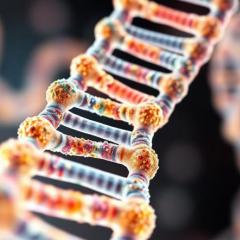UQ Diamantina Institute researchers have received funding from the National Health and Medical Research Council (NHMRC) across seven projects in the areas of genomic medicine, cancer including melanoma and breast cancer and autoimmune diseases such as rheumatoid arthritis.
UQDI’s success rate for NHMRC Project Grants was 21.2 per cent compared to the national average success rate of 14.9 per cent.
Professor Matt Brown, Director of UQ’s Diamantina Institute said he was delighted to congratulate the following researchers for their success in what was the most competitive round ever for NHMRC grants.
“The research funded in this round of NHMRC grants will translate directly into improved outcomes for patients,” Professor Brown said.
Genomic Medicine
Professor David Evans has been awarded funding for two genomic medicine research programs.
In the first program, he and his collaborators will develop new ways to analyse DNA modification patterns in order to better understand genetic and environmental contributors to disease.
In the second program, Professor Evans and his colleagues will investigate gene expression signatures in critically ill patients with septic shock. There are more than 15,000 cases of septic shock in Australia and New Zealand each year, one in five of which are fatal. His research will aim to identify which patients will respond to corticosteroid therapy.
Cancer
Melanoma accounts for approximately 10% of all cancers in Australia and causes 75% of skin cancer deaths. More than 12,000 Australians will be diagnosed with melanoma this year alone.
Associate Professor Kiarash Khosrotehrani has been awarded funding for a melanoma research program that focuses on blood vessel formation around tumours. The research seeks to identify the mechanisms that drive the early stage development of these blood vessels, with the aim of finding new ways to prevent tumour progression and spreading.
Dr Nikolas Haass received NHMRC funding for his research looking at the composition of melanoma tumours and how zones of fast growing cells, zones of dormant cells and zones of invasive cells contribute to drug resistance. The NHMRC funding will enable Haass to investigate the molecular drivers of this tumour heterogeneity, particularly the role played by a protein called MITF.
Approximately 15,000 Australian women will be diagnosed with breast cancer in 2014. It is the most common cancer among women in Australia.
Dr Roberta Mazzieri has been awarded funding to progress her research into a treatment for human breast cancer that delivers an anti-cancer molecule directly to a tumour, thereby activating an immune response. The funding will enable her to test the new approach in combination with promising immunotherapies with the goal of developing new and more effective cancer treatments.
Autoimmune Diseases
Rheumatoid Arthritis affects approximately 450,000 people in Australia and millions more worldwide. Professor Ranjeny Thomas was awarded funding for her research into the interaction between citrullinated peptides and T-cells, and how this drives the development of autoimmunity in rheumatoid arthritis.
Dr Andrew Brooks, who will be joining UQDI in November 2014, has been awarded NHMRC funding for research on class I cytokine receptors, which are involved in a wide range of important cellular functions and are major therapeutic targets for diseases such as cancer, inflammatory bowel disease, osteoporosis, multiple sclerosis, and disorders related to blood cell formation. Dr Brooks will investigate the structure-function relationship of this class of proteins and will also screen for small molecules that can block or activate these receptors.



